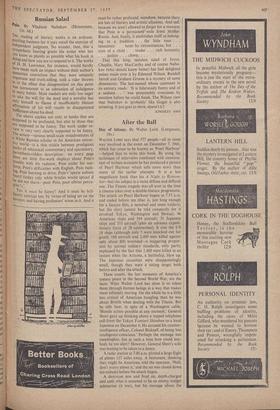Russian Salad
THE reading of literary works is an arduous, Puzzling business for it may entail the exercise of independent judgment. No wonder, then, that a sYmpathetic hearing greets the writer who lets You know as plainly as possible what his book is doing and how you are to respond to it. The works of D. H. Lawrence, for instance, would hardly have made such an impact without their author's stentorian conviction that they were uniquely Important and truth-telling, with a rider thrown in to the effect that disagreement on this point Was tantamount to an admission of indulgence in nasty habits. Most readers are only too eager to take the will for the deed and a novelist has Only himself to blame if insufficiently blatant affirmation of his will results in disappointed bafflement about his deed. The above applies not only to books that are supposed to be profound, but also to those that are supposed to be funny. The work under re- view is very very clearly supposed to be funny. The action—various small-scale misadventures of a White Russian scholar in the American univer- sitY world—is a thin trickle between prodigious banks of whimsical commentary and ejaculatory, Parenthesis-ridden description : on every page there are little fire-work displays about Pnin's trouble with his radiator, Pnin under his sun- lamp, Pnin's difficulties with English, Pnin bath- ing, Pnin learning to drive, Pnin's 'sparse auburn beard (today only white bristles would sprout if he did not shave—poor Pnin, poor albino porcu-
pine !).'
Yes, it must be funny ! And it must be bril- liantlY satirical too, by virtue of being set on the campus, and having professors' wives in it. And it must be rather profound, somehow, because there are lots of literary and artistic allusions. And sad, because we aren't allowed to forget for a moment that Pnin is a permanent' exile from Mother Russia. And, finally, it establishes itself as belong- ing to a tradition . . . the little man . . . innocence . . . beset by circumstances, but . . . eyes of a child . . . tender . . . rich humanity . . . pathos . . . . . That this limp, tasteless salad of Joyce, Chaplin, Mary MacCarthy and of course Nabo- kov (who should knovy better) has had delighted noises made over it by Edmund Wilson, Randall Jarrell and Graham Greene is a mystery of some dimensions. The last-named whose comment in its entirety reads : 'It is hilariously funny and of a sadness . . .' was presumably overcome by emotion before he could finish. The Wilson view that Nabokov is 'probably' like Gogol is also arresting. It just goes to show, doesn't it?
KINGSLEY AMIS
































 Previous page
Previous page